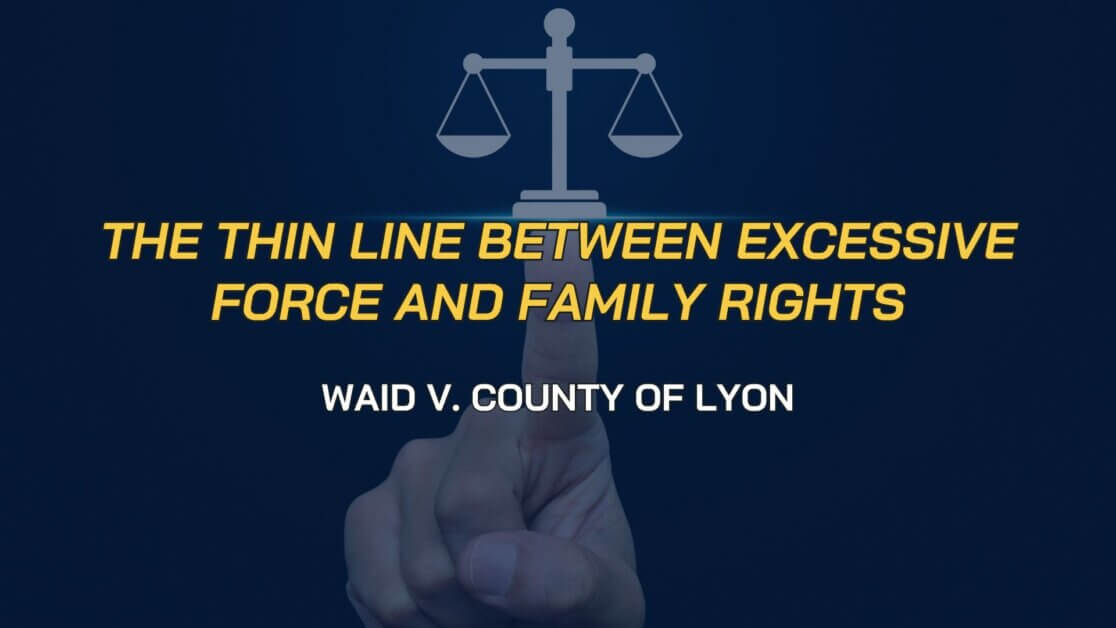Last week, the United States Supreme issued a decision in Fernandez v. California[1] clarifying an earlier decision in Georgia v. Randolph, 547 U.S. 103 (2006), which held that when multiple individuals reside at a premises, if a physically present individual objects to a warrantless search of the residence, the police may not search the residence even if another occupant consents to the search.
The factual background of the Fernandez case is as follows:
Walter Fernandez committed a violent robbery and fled from the scene. When police officers arrived in the area, a man told them that Fernandez was in an apartment building. The officers then observed another man run through the alley and into the apartment building. After a minute or two, the officers heard fighting coming from within the building. The officers knocked on the door from which the screaming and fighting was heard. Roxanne Rojas answered the door and appeared to be crying. She had a large bump on her nose, and the officers noticed blood on her shirt and hand from an apparent fresh injury. When asked if there was anyone else in the apartment, Rojas told the officers that only her 4-year-old son was present. The officers asked Rojas to step outside the apartment so they could conduct a protective sweep. At that point, Fernandez appeared at the door, in an agitated state, and told the officers that they could not come in to the apartment. The officers suspected that Fernandez had assaulted Rojas, removed him from the apartment, placed him under arrest, and took him to the station for booking.
The officers returned to the apartment approximately one hour later and informed Rojas that Fernandez had been arrested. After a request from the officer, Rojas gave them both oral and written consent to search the apartment. The search revealed items connecting Fernandez to the robbery, as well as weapons and ammunition.
Prior to trial, Fernandez filed a motion to suppress the evidence obtained from the apartment, but the court denied the motion. Fernandez was convicted of charges, including robbery and infliction of corporal injury. The Appellate Court affirmed the trial court’s decision finding that an occupant may give consent to search a shared residence, and, since Fernandez was not present at the time that Rojas consented, the trial court’s decision regarding the motion to suppress evidence was proper.
The Fourth Amendment guarantees the right to be free from unreasonable search and seizures, and provides that warrants shall not be issued without probable cause. The United States Supreme Court has established that generally officers are required to obtain a warrant before searching a home. The Supreme Court, however, has also established certain exceptions to the warrant requirement. One such exception to the warrant requirement is when the owner or occupant of the home gives consent.[2] Supreme Court precedent provides that “the consent of one who possesses common authority over premises or effects is valid as against the absent, nonconsenting person with whom that authority is shared.”[3] There is, however, a limitation to the circumstances under which one resident of a jointly occupied premises can give consent to a search. In Georgia v. Randolph,[4] the Supreme Court found that a physically present inhabitant of a home may refuse consent to search the premises, regardless of the consent of a fellow occupant. The controlling factor under these circumstances is that the objecting occupant must be present.
In the present case, Fernandez claims that even if he was not present at the time that Rojas gave consent to the search, Randolph still applied to the circumstances of his case. Fernandez first argued that it did not matter that he was absent at the time Rojas gave her consent to search the apartment since he was only absent because the officers had removed him from the premises. Fernandez further argues that it was sufficient that he objected to the search when he was at the doorway of the premises, prior to his arrest, and that his objection should remain in effect until he “no longer wished to keep the police out of his home.”
With regard to Fernandez’s first argument, the Court points out that Fernandez did not contest that the police had reasonable grounds for removing him from the premises, nor did he contest that the police had probable cause to place him under arrest. The Court discussed dicta in the Randolph case, which stated that consent by one occupant may not be sufficient if there is “evidence that the police have removed the potentially objecting tenant from the entrance for the sake of avoiding a possible objection.” The Court reasoned, however, that it would not undertake an “inquiry into the subjective intent of officers who detain or arrest a potential objector,” but rather apply a test of objective reasonableness. The Court reiterated that Randolph unequivocally requires that the individual who refuses consent to search a premises must be physically present to make such an objection. Since Fernandez had been placed under arrest for assault and removed from the premises, and was not present when Rojas’ gave her consent to search the house, her consent in his absence was sufficient. The Court held that “an occupant who is absent due to a lawful detention or arrest stands in the same shoes as an occupant who is absent for any other reason.”
The Court then turned to Fernandez’s second argument that his initial refusal to consent to a search, while he was still at the threshold of the apartment, was in full force until he changed his mind and withdrew his objection. The Court found that this argument was inconsistent with the holding in Randolph, which relied upon “widely shared social expectations” and “customary social usage” of a shared residence. Furthermore, this argument would create the necessity for an unreasonable interpretation as to a continuing objection. In other words, it would require that the scope and duration of an objection to a search be defined, creating a burdensome and unreasonable process.
The Court also rejected Fernandez’s argument that an expansive interpretation of Randolph would not hamper law enforcement because in most cases where officers have reasonable cause to arrest an individual, they also have reasonable cause to conduct the search of the premises, even if the individual objects to the search. As an initial matter, the Court reasoned that warrantless consent searches are reasonable under the Fourth Amendment regardless of whether the officers could have obtained a search warrant. To require the imposition of a search warrant, in those cases in which a consent to search is sufficient, would impose an unreasonable burden on both law enforcement and the individual who consents to a search, since the warrant process entails delay. The Court stated, “requiring the police to obtain a warrant may unjustifiably interfere with legitimate law enforcement strategies.”
The Court’s decision in Fernandez reiterates its holding in the Randolph case that the party must be physically present to voice an objection to a search of the premises. A review of this present case, however, indicates that a problem may arise if the only reason police officers remove a subject from the premises is to stop that individual from voicing an objection. The Court, however, refuses to analyze the motive of a police officer for removing the party, but rather whether the actions taken were objectively reasonable. In other words, if the police officer has a lawful purpose for removing the individual from the premises, his underlying motive for doing so will not come into play.
In summary, when a residence is occupied by multiple individuals, one occupant may give consent to the police to search. If an occupant, who is present at the time objects to a search, officers may not search the premises – even if another occupant gives consent. Following the holding of this case, even if an occupant initial objects to a search, if that occupant is lawfully detained or arrested, another occupant can later give consent to the search in the same manner as if the initially objecting occupant had not been present. The only caveat to this holding is that if the purpose of removing an occupant from the premises is not lawful, but rather to stop the party from objecting to the search, then the consent to search may not be reasonable.
This publication is produced to provide general information on the topic presented. It is distributed with the understanding that the publisher (Daigle Law Group, LLC.) is not engaged in rendering legal or professional services. Although this publication is prepared by professionals, it should not be used as a substitute for professional services. If legal or other professional advice is required, the services of a professional should be sought.



